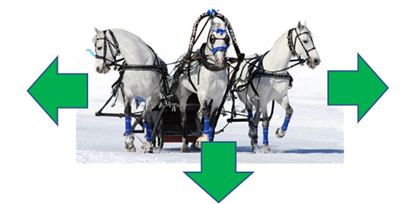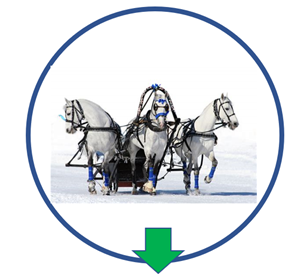Mobilising Communities Against Climate Change.
Climate change is an enormous subject. It can be complicated but is not necessarily so. Taking the subject back to basics, all we have to do is to stop greenhouse gas emissions. To achieve that we have to reduce the demand for products and services that generate greenhouse gases . That means changes in behaviour by every individual and entity. Fortunately, there are lots of people and organisations who want to help. There is an enormous opportunity and potential to reach net zero. For example, in North Yorkshire, there are over 20 formal organisations who have arresting climate change as a primary, if not their only objective, plus a plethora of small climate community action groups. It is possible though, that each of the organisations, as shown in this image of a troika, is pulling in a different direction, wasting time, efficiencies and benefits of scale.

The key question is how can all these organizations be effectively facilitated to achieve their own and broader climate goals? The problem is not easily solved. Neither the Government nor the local authority can mandate a local climate action group to take a particular course of action. Using the troika image again, what we all need to do is have everyone pointing in the same direction. This will create both synergies and cost, time and resource saving. Having said that how can we get everyone voluntarily pulling in the same direction? Dialogue, trust and sustained engagement are at the heart of the solution.

To demonstrate commitment, there is a requirement for a multilateral leading organisation that with will encourage action, offer education, empower communities, offer seed corn investments. Such an organisation should be led by an independent, respected individual with connections across all sectors in the region. The leading group will be supported by an open digital climate hub accessible to every individual and community, such as CitizenLab from Koru Consulting. This hub will comprise:
- A searchable database allowing anyone to identify “who is doing what”
- Projects details for each community
- Positive stories
- Ask the communities a question
- Inter-communities collaboration page(s)
- Volunteering page(s)
- Regular Forums/Hackathons
- A map identifying location of groups/projects
- Access to the national Klimate Konnect site
- Newsletter posting and distribution
The key benefits are as follows:
- The best way to get things done is to get the people nearest the problem and solution involved, and this is what this approach delivers
- An agreed voluntary plan as to how communities can collaborate to achieve their own and their councils’ goals
- Synergies through collaboration and deployment of projects.
- Reduced overall cost. As a result of being able to avoid ‘re-creating the wheel’ at a very local level, mistakes can be reduced and in some cases, economies of scale can be brought by a more consolidated approach
- The benefit of the ‘snowball effect’. When everyone has a common source for input and ideas, they feel more inclined to contribute and get involved, increasing momentum, ideas and ‘feet on the street’ support
- Improved communication performance from the Authority/sponsor, with a single hub to better engage all those involved.

